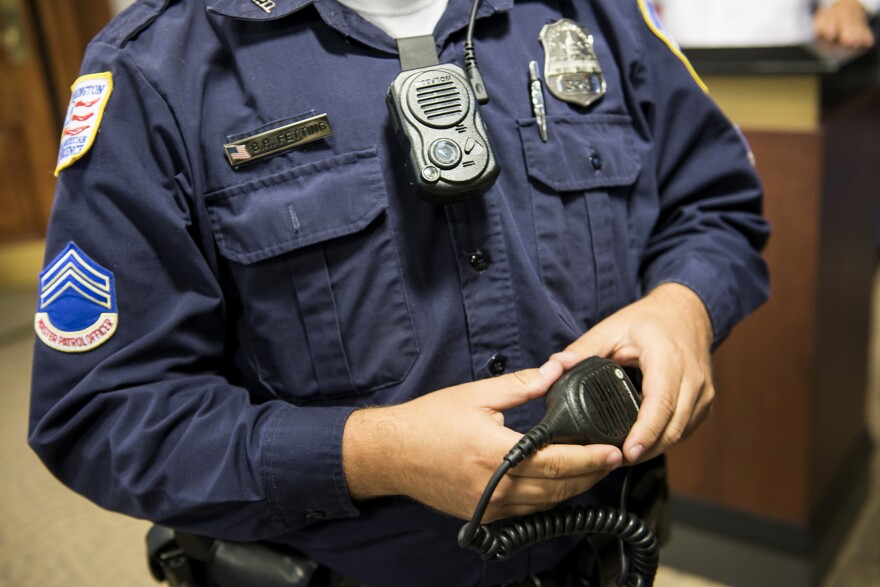This archival content was originally written for and published on KPCC.org. Keep in mind that links and images may no longer work — and references may be outdated.
LA Sheriff's body cam plan draws mixed reviews

The Los Angeles County Sheriff Civilian Oversight Commission Thursday got its first look at the department’s proposal to use body cameras. While the panel didn’t take a position on the plan to outfit nearly 6,000 deputies, it heard a variety of views from watchdogs who attended the meeting.
"This is a department that has a lot of problems," said Michelle Infante of Dignity and Power Now, a group that has spearheaded the push for reforms including the creation of the civilian panel. "There are other priorities other than having cameras."
She cited improving care for thousands of jail inmates who are mentally ill and creating diversion programs for low-level offenders who should not be locked up in the first place.
"They need resources," said Graciela Lopes of the Immigrant Youth Coalition. She called the body cam proposal "a waste of money."
In a letter to the oversight panel, the American Civil Liberties Union of Southern California said that it would support placing body cameras on sheriff’s deputies under certain conditions.
"The ACLU can only support the use of body cameras when it is done pursuant to a policy that actually furthers the goals of transparency and officer accountability," ACLU Attorney Melanie Ochoa told KPCC.
Video of deputy-involved shootings should be released to the public within 30 days after the incident, deputies must not be allowed to see video involving their use of force before giving a statement to investigators, and deputies should be required to give notice to people when they are recording, the ACLU’s letter stated.
The letter also emphasized body cams should not be used for general surveillance, a longtime concern of some activists.
In light of recent LAPD body cam video played in court that raised questions about whether an officer had planted drugs on a suspect, Ochoa said the sheriff's department should either have its cameras on all the time or program them so that when they are turned on, they have a recording of the previous 30 minutes.
"Without this framework, body cameras could do more harm than good and are not worth the public funds to obtain and maintain them," said Ochoa.
She also said cameras should be used mostly to watchdog deputies – not in prosecutions.
Civilian panel member Sean Kennedy, a former federal public defender, disagreed.
"I think there are lot of defendants who will be well served by seeing that footage," he said.
Kennedy said he wasn’t surprised by the varying views of body cameras expressed at the meeting."I think from day one it’s been controversial," he said.
The sheriff’s plan calls for hiring a total of 239 people over four years to manage, review and edit millions of hours of video. The first year would be spent deciding on a body cam vendor and setting up infrastructure, like docking stations where deputies would upload video at the end of their shifts.
The second year would see a rollout of cameras at six sheriff’s stations, with a focus on areas with high rates of crime, arrests and legal claims by residents against the department.
At full deployment, 5,895 patrol and other deputies who regularly come in contact with the public would carry cameras. The department estimates the entire program would cost $55 million a year.
The use of body cameras by law enforcement agencies around the country has had varying results, said Craig Uchida of Justice and Security Strategies, Inc., a consultant working with the sheriff’s department who made a presentation at the meeting.
Studies of programs in Mesa, Arizona and Orlando, Florida found citizen complaints dropped 60 percent and use of force fell 75 percent, he said. But a study of the Washington, D.C. Metropolitan Police Department found no difference in complaints or use of force when comparing officers who were wearing cameras with those who were not.
There has been no comprehensive study of a program at the LAPD, but its central division saw complaints against officers fall more than 30 percent during the first half of this year, the division’s captain told KPCC.
Sheriff Jim McDonnell has said he intends to move forward with a body camera program once the Board of Supervisors gives him the money. The board has yet to take up the issue.
McDonnell has not proposed specific policies regarding the use of cameras, but has promised to release at least some video of high profile incidents, including deputy-involved shootings. He plans to release body cam video to the public upon request unless it involves incidents still under investigation or would violate someone’s privacy, according to department officials.
That would put the sheriff at odds with the LAPD, which doesn’t release any body cam video - although the police commission is reviewing that policy.
